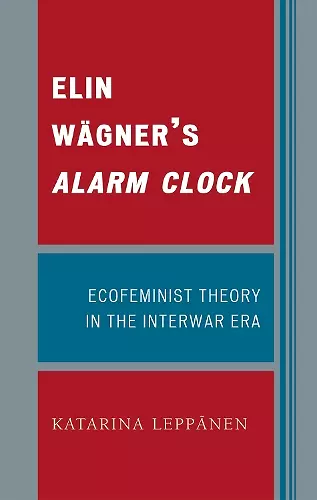Elin Wägner's Alarm Clock
Ecofeminist Theory in the Interwar Era
Format:Hardback
Publisher:Lexington Books
Published:6th Nov '07
Currently unavailable, and unfortunately no date known when it will be back

This book analyses the ideas of the Swedish journalist, feminist, and literary author Elin Wägner (1882-1949), as conveyed in her book Väckarklocka (1941), in a European feminist context. This context is presented in terms of three elements. Firstly, the German sociologist/educationalist Mathilde Vaerting and her sociology of power played an important role in Wägner's development of a theory of matriarchy. Secondly, the influence of the Austrian feminist Rosa Mayreder and her theory of masculine civilization and feminine culture are analyzed in relation to Wägner's development of what might be called an early ecological feminism. Thirdly, the mainly unknown Women's Organization for World Order (WOWO) is presented. 0s and 1930s, which wanted to strengthen women's position and confidence as political citizens by providing them with a historical past where women ruled (matriarchy). Thereby they not only reinvented a past, but also revitalized the emergence or eternity of patriarchy. These women discussed the possibility of women offering an alternative to the prevailing order. A special analysis is made of Mayreder's and Wägner's way of discussing what woman is and in what ways she can challenge the system. Both argued that women ought to have the same rights and duties as men, but that this should not require them to adapt to the distorted male system. This study argues that this position, easily characterized as "essentialist" in modern feminist terms, is in fact functional and strongly emancipatory in its time and context. In this reevaluation of Väckarklocka Katarina Leppänen has established this important Swedish novel as a text central to the development of the feminist movement. Elin Wägner's Alarm Clock is a book suitable for students of Swedish Literature and European Feminism.
By reading Elin Wägner´s Väckarklocka in an European context, rather than a purely Swedish context, which is often done, many of the ideas of the book appear clearly as part of a larger political project which entailed a re-evaluation of the prevailing social order. What Leppänen shows in Elin Wägner's Alarm Clock is that the debate on matriarchy in the 1920s and 1930s was much stronger and vital than has been known before. And that this position, often characterised negatively as essentialism in modern feminist terms, was, in fact, functional and strongly emancipatory in its time and context. Elin Wägner's Alarm Clock is a good contribution to the complex history of European feminism... -- Lena Eskilsson, Umeå University
By reading Elin Wägner´s Väckarklocka in an European context, rather than a purely Swedish context, which is often done, many of the ideas of the book appear clearly as part of a larger political project which entailed a re-evaluation of the prevailing social order. What Leppänen shows in Elin Wägner's Alarm Clock is that the debate on matriarchy in the 1920s and 1930s was much stronger and vital than has been known before. And that this position, often characterised negatively as "essentialism" in modern feminist terms, was, in fact, functional and strongly emancipatory in its time and context. Elin Wägner's Alarm Clock is a good contribution to the complex history of European feminism. -- Lena Eskilsson, Umeå University
ISBN: 9780739120033
Dimensions: 239mm x 160mm x 24mm
Weight: 567g
252 pages